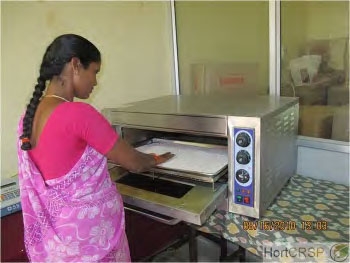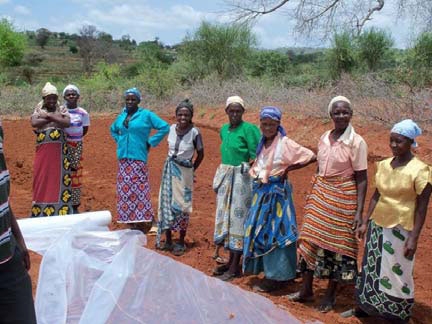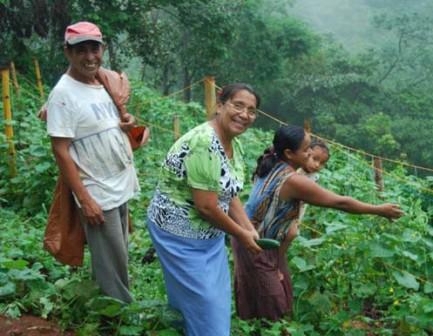Posts Tagged: global health
Addressing nutrition and poverty through horticulture
Nutrition, food security and sufficient family incomes are challenges in many parts of the world. Half the world’s people live in rural areas in developing countries. Because hunger and malnutrition are often linked to poverty, providing economic opportunities through horticultural production not only helps family incomes, but also addresses food security and nutrition. Training women to produce and market horticultural crops in the developing world also helps provide a much-needed income stream for families with children.
UC Davis is addressing food security and economic development in Africa, Southeast Asia, Central America, and elsewhere, by coordinating an international horticulture program. The Horticulture Collaborative Research Support Program (Hort CRSP; pronounced "hort crisp") is one of 10 CRSP programs that focus on global food production and solving food and nutrition problems in developing countries. UC Davis leads the Hort CRSP, with funding support from the U.S. Agency for International Development (USAID).
Examples of projects conducted by researchers and educators throughout the world include:
- Inexpensive cold storage systems in rural, developing areas to prolong food longevity; see page 2
- Concentrated solar drying of fruits and vegetables in East Africa; see page 3
- Improving safety and quality of tomatoes in Nigeria; see page 3
- Smallholder flower production in Honduras for export markets; see page 3
The overarching goals of the Hort CRSP are to reduce poverty and improve nutrition and health of the rural poor, while improving the profitability and sustainability of horticulture in the developing world. Priorities in the Hort CRSP include gender equity, sustainable crop production, postharvest technology, food safety, market access, and financing. The program awards research funding in the U.S. and abroad to:
- Realize opportunities for horticultural development
- Improve food security
- Improve nutrition and human health
- Provide opportunities for income diversification
- Advance economic and social conditions of the rural poor, particularly women
Dr. Elizabeth Mitcham, UC Cooperative Extension specialist in the Department of Plant Sciences at UC Davis and director of the Hort CRSP, notes, “By harnessing the research, training, and outreach expertise of the land-grant universities in the U.S. to work with partners in developing countries, we can improve horticultural capabilities in much the same way that the land-grant system helped revolutionize American agriculture.”
In the three years since the program’s inception, several projects have been completed, and many are ongoing. The program’s website offers a plethora of information, along with newsletters that highlight individual projects.
The program also has a YouTube channel, with videos on Hort CRSP projects. Some of the videos are about projects that are especially important in developing countries, including:
- The TRELLIS project — bringing together graduate students and in-country development organizations; YouTube link
- Using cell phones to give real-time information to growers in rural areas of India; YouTube link
- Inexpensive cultivation practices for smallholder farmers; YouTube link
- Indigenous products increase incomes in Ghana; YouTube link
- Saving indigenous crop seeds in Southeast Asia for resource-poor farmers; YouTube link
UC Davis, ranked first in the U.S. on research related to agriculture, food science and nutrition, and plant and animal science, is positioned to serve global needs related to food and nutrition. Of the 10 CRSP programs administered by USAID, two of the programs are based at UC Davis — the Hort CRSP program, and the BASIS CRSP, which was highlighted in a recent Food Blog post and addresses financial issues related to agricultural productivity.
Feeding a hungry planet
Agricultural innovation and technological advances have been harvested from UC Davis over the last century. As advances are achieved, our growing global population applies pressure for researchers to achieve more. California is a top world-wide producer of agricultural products, and California researchers work hard to find new and better ways to produce food.
The UC Davis College of Agricultural and Environmental Sciences (CA&ES) does much to contribute towards this effort. The recent CA&ES Outlook: Feeding a Hungry Planet highlights current research and innovations to provide agricultural producers knowledge and technology needed to make better, faster and economically sound decisions. This work is focused towards agriculture, conservation and economics. The articles are interesting and provide much food for thought.
For instance:
- Everyone needs to eat, and our global population is growing quickly. Economists have documented substantial long-term benefits of agricultural research.
- To continue feeding a growing population we have two options: increase yields on land already in production, or expand agriculture onto new land.
- UC researchers are developing “precision agriculture” methods, which use global positioning systems (GPS), geographic information systems (GIS), wireless networks, and innovative sensor technology to deliver precise amounts of water, fertilizer and pesticides to individual plants or small blocks of plants. This individualized management will save growers money and reduce the potential environmental load from excess fertilizer and pesticide use.
- Using GPS, a mechanical weeder has been developed. This will save growers money and reduce the need for herbicide use. On-campus testing has been successful and the weeder will be tested in a commercial field next year.
- Increasing biodiversity on and near the farm provides many benefits towards increased food production while increasing the sustainability of farming systems.
Learn more about these topics and many others in the Fall/Winter edition of CA&ES Outlook. To find out more about the UC Davis College of Agricultural and Environmental Sciences, or to view previous publications please visit their website.
Milk’s secret for fighting childhood infections
UC Davis microbiologist David Mills received a grant from the Bill and Melinda Gates Foundation to test whether certain milk sugars can prevent life-threatening diarrheal diseases in young children. Globally, these gastrointestinal infections are the second leading cause of death among children under the age of five, each year killing 1.5 million children.
Mills, an authority on the molecular biology of lactic acid bacteria used in foods, said, “We will examine the ability of these compounds from milk to prevent gastrointestinal infections and to establish healthy bacteria in the intestines.” He and his colleagues are working to move the basic research toward practical applications in human health.
Earlier research has shown that similar oligosaccharides in human breast milk play an important role in supporting growth of protective bacteria in babies’ digestive tracts. Such bacteria are known to minimize the risk and severity of diarrheal disease and other gastrointestinal infections in infants.
The UC Davis researchers are hopeful that milk from cows will provide an abundant source of oligosaccharides that have comparable therapeutic characteristics for young children who are no longer breast-feeding.
Mills noted that if the researchers’ hypothesis proves correct, they plan to explore how oligosaccharides can be incorporated in a healthful, cost-effective manner into various food products designed for nutritional therapy and for use in international famine and malnutrition relief efforts.
For more information, read the full press release.





